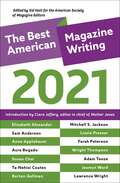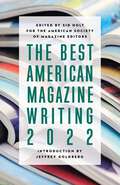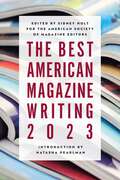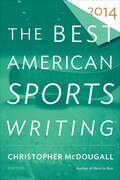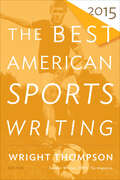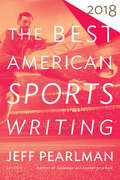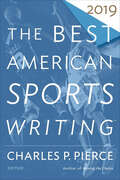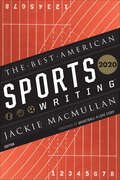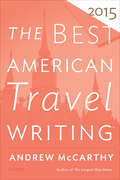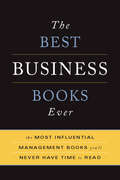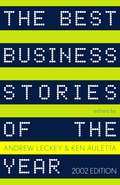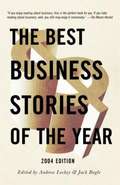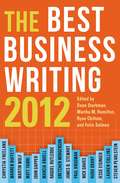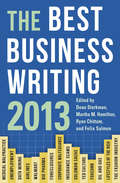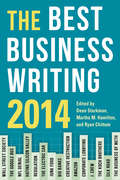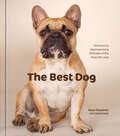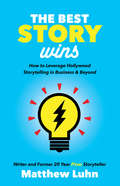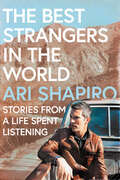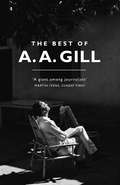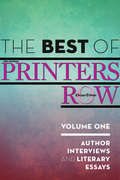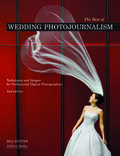- Table View
- List View
The Best American Magazine Writing 2021
by Sid HoltThe Best American Magazine Writing 2021 presents outstanding journalism and commentary that reckon with urgent topics, including COVID-19 and entrenched racial inequality. In “The Plague Year,” Lawrence Wright details how responses to the pandemic went astray (New Yorker). Lizzie Presser reports on “The Black American Amputation Epidemic” (ProPublica). In powerful essays, the novelist Jesmyn Ward processes her grief over her husband’s death against the backdrop of the pandemic and antiracist uprisings (Vanity Fair), and the poet Elizabeth Alexander considers “The Trayvon Generation” (New Yorker). Aymann Ismail delves into how “The Store That Called the Cops on George Floyd” dealt with the repercussions of the fatal call (Slate). Mitchell S. Jackson scrutinizes the murder of Ahmaud Arbery and how running fails Black America (Runner’s World).The anthology features remarkable reporting, such as explorations of the cases of children who disappeared into the depths of the U.S. immigration system for years (Reveal) and Oakland’s efforts to rethink its approach to gun violence (Mother Jones). It includes selections from a Public Books special issue that investigate what 2020’s overlapping crises reveal about the future of cities. Excerpts from Marie Claire’s guide to online privacy examine topics from algorithmic bias to cyberstalking to employees’ rights. Aisha Sabatini Sloan’s perceptive Paris Review columns explore her family history in Detroit and the toll of a brutal past and present. Sam Anderson reflects on a unique pop figure in “The Weirdly Enduring Appeal of Weird Al Yankovic” (New York Times Magazine). The collection concludes with Susan Choi’s striking short story “The Whale Mother” (Harper’s Magazine).
The Best American Magazine Writing 2022
by Sid HoltThe Best American Magazine Writing 2022 presents a range of outstanding writing on timely topics, from in-depth reporting to incisive criticism: Kristin Canning calls for a change in how we talk about abortion (Women’s Health), and Ed Yong warns us about the next pandemic (The Atlantic). Matthieu Aikins provides a gripping eyewitness account of the Taliban’s seizure of Kabul (New York Times Magazine). Heidi Blake and Katie J. M. Baker’s “Beyond Britney” examines how people placed under legal guardianship are deprived of their autonomy (BuzzFeed News). Rachel Aviv profiles a psychologist who studies the fallibility of memory—and has testified for defendants including Harvey Weinstein and Bill Cosby (The New Yorker).The anthology includes dispatches from the frontiers of science, exploring why Venus turned out so hellishly unlike Earth (Popular Science) and detailing the potential of NASA’s James Webb Space Telescope (Quanta). It features celebrated writers, including Harper’s magazine pieces by Ann Patchett, whose “These Precious Days” is a powerful story of friendship during the pandemic, and Vivian Gornick, who offers “notes on humiliation.” Carina del Valle Schorske depicts the power of public dance after pandemic isolation (New York Times Magazine). And the NBA icon Kareem Abdul-Jabbar lauds the Black athletes who fought for social justice (AARP the Magazine). Amid the continuing reckoning with racism, authors reconsider tarnished figures. The Black ornithologist and birder J. Drew Lanham assesses the legacy of John James Audubon in the magazine that bears his name, and Jeremy Atherton Lin questions his youthful enthusiasm for Morrissey (Yale Review). Jennifer Senior writes about memory and the lingering grief felt for a friend killed on 9/11 (The Atlantic). The collection concludes with Nishanth Injam’s story of queer first love across religious boundaries, “Come with Me” (Georgia Review).
The Best American Magazine Writing 2023
by Sidney HoltThe Best American Magazine Writing 2023 offers a selection of outstanding journalism on timely topics, including inequalities and injustices pressuring families, especially mothers. Rozina Ali tells the story of a U.S. marine who unlawfully adopted an Afghan girl and her family’s efforts to bring her home (New York Times Magazine). A Mother Jones exposé confronts the imprisonment of women for failing to protect their children from their abusive partners. “The Landlord and the Tenant” juxtaposes the lives of a poor single mother convicted for her children’s deaths in a fire and the man who owned the fatal property (ProPublica with Milwaukee Journal Sentinel). Caitlin Dickerson investigates the history of the U.S. government’s family-separation policy (The Atlantic). Jia Tolentino’s New Yorker commentary considers abortion in a post-Roe world.The anthology features pieces on a wide range of subjects, such as Nate Jones on the “Nepo Baby” and Allison P. Davis’s essay about a decade on Tinder (New York). Natalie So recounts how her mother’s small computer chip company became the target of a Silicon Valley crime ring (The Believer). Clint Smith asks what Holocaust memorials in Germany can teach the United States about our reckoning with slavery (The Atlantic). Esquire’s Chris Heath examines the FBI’s involvement in a plot to kidnap the governor of Michigan. Courtney Desiree Morris takes a queer psychedelic ramble through New Orleans (Stranger’s Guide). Namwali Serpell reflects on representations of sex workers (New York Review of Books). An ESPN Digital investigation uncovers Penn State’s other serial sexual predator before Jerry Sandusky. Profiles of the acclaimed actress Viola Davis (New York Times Magazine) and the self-taught artist Matthew Wong (New Yorker), as well as Michelle de Kretser’s short story “Winter Term” (Paris Review), round out the volume.
The Best American Sports Writing 2014 (Best American Ser.)
by Christopher McDougall“Excellent . . . A no-brainer pickup for the sports collection.” — Booklist“An affirmation of the strong state of American sportswriting.” — Kirkus ReviewsFrom more than 350 national, regional, and specialty publications and, increasingly, the top sports blogs, Christopher McDougall, best-selling author of Born to Run: A Hidden Tribe, Superathletes, and the Greatest Race the World Has Never Seen, hand-selected the very best sports journalism of the past year.
The Best American Sports Writing 2015 (The Best American Series)
by Wright ThompsonFor twenty-five years, The Best American Sports Writing has built a solid reputation by showcasing the greatest sports journalism of the past year, culled from hundreds of national, regional, and specialty print and digital publications. Wright Thompson, many times included in this volume over the years, takes his turn at the helm by curating this exceptional collection. The only shared trait among these diverse pieces is the extraordinarily high caliber of writing, but collectively they tap into the pure passion that can only come from sports. And for all aspiring sports writers, says Thompson, &“these selections are both road map and compass.&” The Best American Sports Writing 2015 includesDon Van Natta Jr., Chris Ballard, Katie Baker, Christopher Beam, Wells Tower, Seth Wickersham, Ariel Levyand others WRIGHT THOMPSON, guest editor, started his sports writing career as a student at the University of Missouri, where he covered sports for the Columbia Missourian. He interned at the Times-Picayune in New Orleans and worked as the LSU beat writer. He then moved to the Kansas City Star, where he covered a wide variety of sports. In 2006 he joined ESPN.com and ESPN: The Magazine as a senior writer. He lives in Oxford, Mississippi. GLENN STOUT, series editor for The Best American Sports Writing since its inception, is the author of Young Woman and the Sea and Fenway 1912. He serves as the long-form editor for SB Nation and lives in Alburgh, Vermont.
The Best American Sports Writing 2017
by Glenn Stout Howard Bryant“Excellent . . . A no-brainer pickup for the sports collection.” —Booklist For over twenty-five years, The Best American Sports Writing has built a solid reputation by showcasing the greatest sports journalism of the previous year, culled from hundreds of national, regional, and specialty print and digital publications. Each year, the series editor and guest editor curate a truly exceptional collection. The only shared traits among all these diverse styles, voices, and stories are the extraordinarily high caliber of writing and the pure passion they tap into that can only come from sports.
The Best American Sports Writing 2018 (The Best American Series ®)
by Jeff Pearlman Glenn StoutFor more than twenty-five years, The Best American Sports Writing has built a solid reputation by showcasing the greatest sports journalism of the previous year, culled from hundreds of national, regional, and specialty print and digital publications. Each year, the series editor and guest editor curate a truly exceptional collection. The only shared traits among all these diverse styles, voices, and stories are the extraordinarily high caliber of writing, and the pure passion they tap into that can only come from sports.
The Best American Sports Writing 2019 (The Best American Series)
by Charles P. PierceThe latest addition to the acclaimed series showcasing the best sports writing from the past year For over twenty-five years, The Best American Sports Writing has built a solid reputation by showcasing the greatest sports journalism of the previous year, culled from hundreds of national, regional, and specialty print and digital publications. Each year, the series editor and guest editor curates a truly exceptional collection. The only shared traits among all these diverse styles, voices, and stories are the extraordinarily high caliber of writing, and the pure passion they tap into that can only come from sports.
The Best American Sports Writing 2020 (The Best American Series)
by Jackie MacMullan, Glenn StoutThe latest addition to the acclaimed series showcasing the best sports writing from the past year.For over twenty-five years, The Best American Sports Writing has built a solid reputation by showcasing the greatest sports journalism of the previous year, culled from hundreds of national, regional, and specialty print and digital publications. Each year, the series editor and guest editor curate a truly exceptional collection. The only shared traits among all these diverse styles, voices, and stories are the extraordinarily high caliber of writing, and the pure passion they tap into that can only come from sports.
The Best American Travel Writing 2015 (Best American Ser.)
by Andrew McCarthyIn his introduction, guest editor Andrew McCarthy says that the best travel writing is &“the anonymous and solitary traveler capturing a moment in time and place, giving meaning to his or her travels.&” The stories in The Best American Travel Writing 2015 demonstrate just that spirit, whether it is the story of a marine returning to Iraq a decade after his deployment, a writer retracing the footsteps of humanity as it spread from Africa throughout the world, or looking for love on a physics-themed cruise down the Rhone River. No matter what the subject, the writers featured in this volume boldly call out, &“Yes, this matters. Follow me!&” The Best American Travel Writing 2015 includes Iris Smyles, Paul Theroux, Christopher Solomon Patricia Marx, Kevin Baker, Benjamin Busch, Maud Newton Gary Shteyngart, Paul Salopek, and others ANDREW MCCARTHY, guest editor, is the author of the New York Times best-selling travel memoir The Longest Way Home. He has served as an editor at large at National Geographic Traveler and been named travel journalist of the year by the Society of American Travel Writers. He is also an actor and director. JASON WILSON, series editor, is the author of Boozehound: On the Trail of the Rare, the Obscure, and the Overrated in Spirits and the digital wine series Planet of the Grapes. He has written for the Washington Post, the Boston Globe, the Philadelphia Daily News, and many other publications. He is the founding editor of The Smart Set and Table Matters.
The Best Business Books Ever: The 100 Most Influential Management Books You'll Never Have Time To Read
by Basic BooksEvery manager could benefit from a solid grounding in the history and evolution of business thinking. The Best Business Books Everis a uniquely organized guide and an illuminating collection of key ideas from the 130 most influential business books of all time. It places both historical and contemporary works in context and draws fascinating parallels and points of connection. Now fully revised and more than 30 percent bigger, this one book highlights the information you need to know and why it's important to know it, and does it all in a succinct, time-saving fashion. Business moves faster than ever these days. For the businessperson who has a growing list of tomes that they can never quite seem to get to,The Best Business Books Everis a must-have.
The Best Business Stories of the Year: 2002 Edition
by Andrew Leckey Ken Auletta"[The editors] cast their net wide, picking up some excellent stories from nontraditional sources that even avid readers of the business press may have missed."-USA Today, on the 2001 edition. Series editor Andrew Leckey and guest editor Ken Auletta have scoured the print media, consulted with the editors of major business and general interest publications, and surveyed journalism school deans to find the best business stories from the last twelve months. Among those selected: Michael Lewis on teenage stock trader Jonathan Lebed, from The New York Times Magazine; James B. Stewart on the irrepressible Michael Milken, from The New Yorker; and many others from the pages of The Wall Street Journal, Rolling Stone, Fortune, Rocky Mountain News, and Wired. The second annual edition continues the excellence and comprehensive range of this fascinating anthology series.
The Best Business Stories of the Year: 2004 Edition
by Andrew Leckey John C. BogleA collection of articles on the business practices, most of them despicable, of 2003-4.
The Best Business Writing 2012 (Columbia Journalism Review Books)
by Ryan Chittum Felix Salmon Dean Starkman Martha HamiltonAn anthology Malcolm Gladwell has called "riveting and indispensable," The Best Business Writing is a far-ranging survey of business's dynamic relationship with politics, culture, and life. This year's selections include John Markoff (New York Times) on innovations in robot technology and the decline of the factory worker; Evgeny Morozov (New Republic) on the questionable value of the popular TED conference series and the idea industry behind it; Paul Kiel (ProPublica) on the ripple effects of the ongoing foreclosure crisis; and the infamous op-ed by Greg Smith, published in the New York Times, announcing his break with Goldman Sachs over its trading practices and corrupt corporate ethos.Jessica Pressler (New York) delves into the personal and professional rivalry between former spouses and fashion competitors Tory and Christopher Burch. Peter Whoriskey (Washington Post) exposes the human cost of promoting pharmaceuticals for off-label uses. Charles Duhigg and David Barboza (New York Times) investigate Apple's unethical labor practices in China. Max Abelson (Bloomberg) reports on Wall Street's amusing reaction to the diminishing annual bonus. Mina Kimes (Fortune) recounts the grisly story of a company's illegal testing—and misuse—of a medical device for profit, and Jeff Tietz (Rolling Stone) composes one of the most poignant and comprehensive portraits of the financial crisis's dissolution of the American middle class.
The Best Business Writing 2013 (Columbia Journalism Review Books)
by Ryan Chittum Felix Salmon Dean Starkman Martha HamiltonAn anthology Malcolm Gladwell has called "riveting and indispensable," The Best Business Writing is a far-ranging survey of business's dynamic relationship with politics, culture, and life. This year's selections include John Markoff (New York Times) on innovations in robot technology and the decline of the factory worker; Evgeny Morozov (New Republic) on the questionable value of the popular TED conference series and the idea industry behind it; Paul Kiel (ProPublica) on the ripple effects of the ongoing foreclosure crisis; and the infamous op-ed by Greg Smith, published in the New York Times, announcing his break with Goldman Sachs over its trading practices and corrupt corporate ethos.Jessica Pressler (New York) delves into the personal and professional rivalry between Tory and Christopher Burch, former spouses now competing to dominate the fashion world. Peter Whoriskey (Washington Post) exposes the human cost of promoting pharmaceuticals off-label. Charles Duhigg and David Barboza (New York Times) investigate Apple's unethical labor practices in China. Max Abelson (Bloomberg) reports on Wall Street's amusing reaction to the diminishing annual bonus. Mina Kimes (Fortune) recounts the grisly story of a company's illegal testing—and misuse—of a medical device for profit, and Jeff Tietz (Rolling Stone) composes one of the most poignant and comprehensive portraits of the financial crisis's dissolution of the American middle class.
The Best Business Writing 2014
by Hamilton Ryan Dean Starkman Martha M. ChittumThe year's most compelling and informative writing on Wall Street corruption, business rebranding, economics, finance, and Silicon Valley values--all in one volume.
The Best Business Writing 2014 (Columbia Journalism Review Books)
by Ryan Chittum Dean Starkman Martha HamiltonThis anthology of the year's best investigative business writing explores the secret dealings of an elite Wall Street society and uncovers the crimes and misadventures of the young founder of Silk Road, the wildly successful online illegal goods site known as the "eBay of vice." It reveals how the Fed dithered while the financial crisis unfolded and explains why the leaders of a two-trillion-dollar bond fund went to war with each other. Articles from the best newspapers and magazines in the country delve into how junk-food companies use science to get you to eat more and how Amazon dodges the tax man how J.Crew revitalized itself by transforming its creative process and Russell Brand went deep on media and marketing after his GQ Awards speech went haywire.Best Business Writing 2014 includes provocative essays on the NFL's cover-ups and corporate welfare, Silicon Valley's ultralibertarian culture, and the feminist critique of Sheryl Sandberg's career-advice book for women, Lean-In. Stories about toast, T-shirt making, and the slow death of the funeral business show the best writers can find worthy tales in even the most mundane subjects.
The Best Creative Nonfiction
by Lee GutkindLee Gutkind, proclaimed the "Godfather behind creative nonfiction" by Vanity Fair, along with the staff of his landmark journal Creative Nonfiction, has culled alternative publications, 'zines, blogs, podcasts, literary journals, and other often overlooked publications in search of new voices and innovative ideas essays and articles written with panache and power.
The Best Dog: Hilarious to Heartwarming Portraits of the Pups We Love
by Aliza EliazarovA gorgeous, heartwarming, and comedic collection of pup portraits and stories celebrating the enduring bond we share with our dogs, from acclaimed photographer, Aliza EliazarovCapturing animals&’ unique personalities with humor and grace for over a decade, Aliza&’s portraits have been exhibited and published widely, including on the covers of Modern Farmer magazine, BarkBox ads, and U.S. postage stamps. From couch potatoes to working dogs, Aliza takes us on a journey revealing the individuality of our loyal companions through dazzling photos and captions that illuminate the deep connection we have with our pets. You&’ll meet Frank, the bulldog who loves a tire; Maggie, the Jack Russell terrier who delivers homemade cookies to lobstermen; Eddy, the hero mutt who saved her farm from a fire; and many more soulful, funny, and downright adorable pups.With evocative portraits and hilarious observations of close to 100 dogs, The Best Dog will confirm what we already know—dogs really are the best.
The Best Interface Is No Interface: The Simple Path to Brilliant Technology
by Golden KrishnaOur love affair with the digital interface is out of control. We've embraced it in the boardroom, the bedroom, and the bathroom. Screens have taken over our lives. Most people spend over eight hours a day staring at a screen, and some "technological innovators" are hoping to grab even more of your eyeball time. You have screens in your pocket, in your car, on your appliances, and maybe even on your face. Average smartphone users check their phones 150 times a day, responding to the addictive buzz of Facebook or emails or Twitter. Are you sick? There's an app for that! Need to pray? There's an app for that! Dead? Well, there's an app for that, too! And most apps are intentionally addictive distractions that end up taking our attention away from things like family, friends, sleep, and oncoming traffic. There's a better way. In this book, innovator Golden Krishna challenges our world of nagging, screen-based bondage, and shows how we can build a technologically advanced world without digital interfaces. In his insightful, raw, and often hilarious criticism, Golden reveals fascinating ways to think beyond screens using three principles that lead to more meaningful innovation. Whether you're working in technology, or just wary of a gadget-filled future, you'll be enlighted and entertained while discovering that the best interface is no interface.
The Best Story Wins: How to Leverage Hollywood Storytelling in Business & Beyond
by Matthew LuhnThe Best Story Wins provides fresh perspectives on the principles of Pixar-style storytelling, adapted by one of the studio&’s top creatives to meet the needs of entrepreneurs, marketers, and business-minded storytellers of all stripes.Pixar movies have transfixed viewers around the world and stirred a hunger in creative and corporate realms to adopt new and more impactful ways of telling stories. Former Pixar and The Simpsons Animator and Story Artist Matthew Luhn translates his two and half decades of storytelling techniques and concepts to the CEOs, advertisers, marketers, and creatives in the business world and beyond. A combination of Luhn&’s personal stories and storytelling insights, The Best Story Wins retells the &“Hero&’s Journey&” story building methods through the lens of the Pixar films to help business minds embrace the power of storytelling for themselves!
The Best Strangers in the World: Stories from a Life Spent Listening
by Ari ShapiroINSTANT NEW YORK TIMES BESTSELLER“The Best Strangers in the World is a witty, poignant book that captures Ari Shapiro’s love for the unusual, his pursuit of the unexpected, and his delight at connection against the odds.”—Ronan Farrow, Pulitzer Prize-winning investigative journalist and New York Times-bestselling author of Catch and Kill and War on PeaceFrom the beloved host of NPR's All Things Considered, a stirring memoir-in-essays that is also a lover letter to journalism.In his first book, broadcaster Ari Shapiro takes us around the globe to reveal the stories behind narratives that are sometimes heartwarming, sometimes heartbreaking, but always poignant. He details his time traveling on Air Force One with President Obama, or following the path of Syrian refugees fleeing war, or learning from those fighting for social justice both at home and abroad.As the self-reinforcing bubbles we live in become more impenetrable, Ari Shapiro keeps seeking ways to help people listen to one another; to find connection and commonality with those who may seem different; to remind us that, before religion, or nationality, or politics, we are all human. The Best Strangers in the World is a testament to one journalist’s passion for Considering All Things—and sharing what he finds with the rest of us.
The Best of A. A. Gill
by Adrian GillFor over twenty years, people turned to A. A. Gill's columns every Sunday - for his fearlessness, his perception, and the laughter-and-tear-provoking one-liners - but mostly because he was the best. 'By miles the most brilliant journalist of our age', as Lynn Barber put it. This is the definitive collection of a voice that was silenced too early but that can still make us look at the world in new and surprising ways.In the words of Andrew Marr, A.. A. Gill was 'a golden writer'. There was nothing that he couldn't illuminate with his dazzling prose. Wherever he was - at home or abroad - he found the human story, brought it to vivid life, and rendered it with fierce honesty and bracing compassion. And he was just as truthful about himself. There have been various collections of A. A. Gill's journalism - individual compilations of his restaurant and TV criticism, of his travel writing and his extraordinary feature articles. This book showcasesthe very best of his work: the peerlessly funny criticism, the extraordinarily knowledgeable food writing, assignments throughout the world, and reflections on life, love, and death. Drawn from a range of publications, including the Sunday Times, Vanity Fair, Tatler and Australian Gourmet Traveller, The Ivy Cookbook and his books on England and America, it is by turns hilarious, uplifting, controversial, unflinching, sad, funny and furious.
The Best of Printers Row, Volume One
by Chicago Tribune StaffChicago Tribune's Printers Row: Interviews, Reviews and Features 2012 is a collection of interviews with authors, reviews of the year's best books, and fascinating features published in the Chicago Tribune's weekly Printers Row literary supplement.Early in 2012, the Chicago Tribune launched its "Printers Row" membership program for those who love books, authors, and conversations about the ideas they generate. The centerpiece is a weekly journal that includes author profiles, book reviews, and Printers Row Fiction in a separate booklet. Chicago Tribune's Printers Row: Interviews, Reviews and Features 2012 is composed of engaging, entertaining, and enlightening profiles, book reviews, as well as extended author interviews and features.
The Best of Wedding Photojournalism
by Bill HurterIn contrast to a traditional wedding photographer, a wedding photojournalist works unobtrusively to capture the "real life" flavor of the special event as it unfolds, and this guidebook addresses the unique challenges and specific preparations required to excel in this field. Calling upon the best and brightest photojournalists to share their images and insights, this updated edition reveals the secrets for capturing all the breathtaking exchanges between the personalities, so that the photographs tell a story rich in detail. Many topics are also covered, such as how to meet and mingle with the main players at a wedding, what to expect in terms of a timeline, what shots cannot be missed, and how to minimize the distractions of flashes, bulky equipment, and verbal requests. Before, during, and after the ceremony--indoors and out--this volume is brimming with advice for every aspect of the shoot, including selecting equipment and lighting, working with an assistant, properly archiving digital files, and selecting a beautiful heirloom-quality album design.
